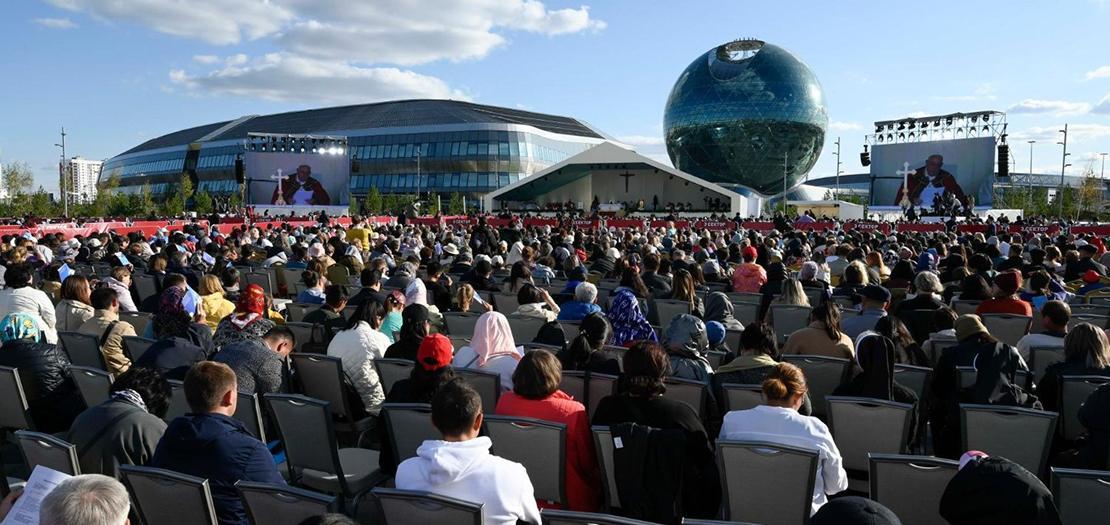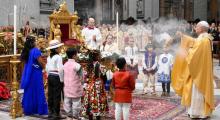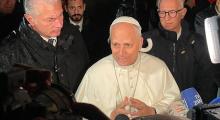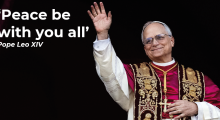Issued by the Catholic Center for Studies and Media - Jordan. Editor-in-chief Fr. Rif'at Bader - موقع أبونا abouna.org

Concluding the 7th Congress of Leaders of World and Traditional Religions in Nur-Sultan, Kazakhstan, on his 38th Apostolic Journey abroad, Pope Francis thanked those present for coming from so many different parts of the world.
“We have travelled this road together,” he said. The Holy Father added that the members’ commitment in the service of dialogue over the course of the conference is more valuable than ever “when the problems of the pandemic have been compounded by the utter folly of war.”
The Pope went on to recall his motto for the visit, “Messengers of Peace and Unity”, noting the deliberate decision to pluralize the word messengers.
"After the events of 11 September 2001, it was necessary to respond collectively to the incendiary atmosphere that terrorist violence sought to incite, and which threatened to turn religion into a grounds for conflict," he said. "Pseudo-religious terrorism, extremism, radicalism and nationalism, dressed up in religious garb, nonetheless continue to foment fears and concerns about religion. In these days, then, it proved providential that we could come together once more, in order to reaffirm the authentic and inalienable essence of religion.”
Kazakhstan, at the heart of the great and pivotal continent of Asia, was the natural place for us to meet, continued the Pope.
Pope Francis stressed that "those who legitimately desire to voice their beliefs must be protected, always and everywhere."
He added that, unfortunately, "many people are even now persecuted and discriminated against on account of their faith", and instead "we must ensure that religious freedom will never be a mere abstraction but a concrete right."
The Pope explained that it is for this reason that the Catholic Church also believes in the unity of the human family. The Church believes that all “humanity forms but one community" and "wishes to continue to do so, for the path of interreligious dialogue is a shared path to peace and for peace; as such, it is necessary and irrevocable."
Pope Francis went on to emphasize three words in the Declaration of our Congress.
The first word is a synthesis of everything, the expression of a heartfelt plea, the dream and the goal of our journey: peace!
"Peace is urgently needed, because in our day every military conflict or hotspot of tension and confrontation will necessarily have a baneful 'domino effect' and seriously compromise the system of international relations."
On the other hand, continued the Pope, peace “is more than the absence of war: it cannot be reduced to the maintenance of the balance of power between opposing forces nor does it arise out of despotic dominion but it is appropriately called ‘the effect of righteousness’.”
He also stressed the importance of entrusting women with greater positions and responsibilities, before introducing the third and final word: youth.
Pope Francis stressed that "young people are messengers of peace and unity, in the present and in the future."
It is they who, more than anyone else, call for peace and respect for the common home of creation, he added.
Concluding his discourse, Pope Francis asked all religious leaders at the Congress in Kazakhstan to "be open to tomorrow yet mindful of yesterday’s sufferings", as we "press ahead on this path, walking together on earth as children of heaven, weavers of hope and artisans of concord, heralds of peace and unity."
Interfaith leaders encourage initiatives for a better world
More than 100 delegations from about 60 countries met from 14-15 September at the VII Congress of Leaders of World and Traditional Religions, which was held in Nur-Sultan, the Kazakh capital city.
At the end of the 2-day Congress, most delegates adopted a declaration, containing principles to be disseminated at regional and national levels, for consideration in all political decisions, legislative norms, educational programs, and mass media in all interested countries.
The declaration, which will also be distributed as an official document of the 77th session of the UN General Assembly, reflects efforts towards promoting interreligious dialogue and fostering inter-civilization cooperation.
In it, the participants express their shared desire for a just, peaceful, secure and prosperous world, affirming the importance of shared values in the spiritual and social development of mankind.
They also recognize the necessity of countering and overcoming intolerance, xenophobia, discrimination and conflicts based on ethnic, religious and cultural differences, as well as extremism, radicalism and terrorism, which lead to religious persecution and the undermining of human life and dignity.
More so, they express concern about the global increase in the number of migrants and refugees in need of humanitarian assistance and recognize the importance of addressing global challenges including climate change, hunger, poverty, among others, in our post-pandemic world.
They also highlight the urgent need for spiritual and political leaders to join efforts to confront the challenges of the world.
In the document consisting of a preamble and 35 paragraphs, the participants further pledged to continue the work of the Congress for the benefit of peace and dialogue between cultures and civilizations.
The participants spoke against the unleashing of military conflict that create hotspots of tension and confrontation and impair international relations, and noted that all forms of violence and wars, whatever their goals, “have nothing to do with true religion and must be rejected in the strongest possible terms.”
The Congress called upon world leaders to abandon all aggressive and destructive rhetoric that leads to the destabilization of the world, and to cease from conflict and bloodshed, urging them to “develop dialogue in the name of friendship, solidarity and peaceful coexistence.”
The document also encouraged acts of mercy and compassion, calling for assistance for regions affected by conflict, natural and man-made disasters.
The declaration further goes on to recognize the importance and value of the Document on Human Fraternity signed by Pope Francis and the Grand Imam of Al-Azhar, Ahmad Al-Tayyeb, in February 2019, and the Makkah Declaration, signed in Mecca on May 2019, which call “for peace, dialogue, mutual understanding and mutual respect among believers for the common good.”
Proceeding from the fact that God created all people equal regardless of race, religion, ethnicity and social status, the participants uphold the value of tolerance, respect and mutual understanding that underpin all religious teaching.
In this regard, they note that pluralism and differences in religion, skin color, gender, race and language are expressions of the wisdom of God's will in creation, and “any incident of coercion to a particular religion and religious doctrine is unacceptable.”
The document, thus, calls for the support of initiatives to implement interreligious and interdenominational dialogue “for the sake of building social justice and solidarity for all peoples.”
The rest of the declaration touched on other issues, including highlighting the importance of strengthening the institution of the family and protecting the rights and dignity of women, among others.
The document concludes by acknowledging the Republic of Kazakhstan for its role as “an authoritative and global center of inter-civilizational, interreligious and interfaith dialogue” and an indication of the desire to hold the 8th Congress in 2025 in Nur-Sultan.






